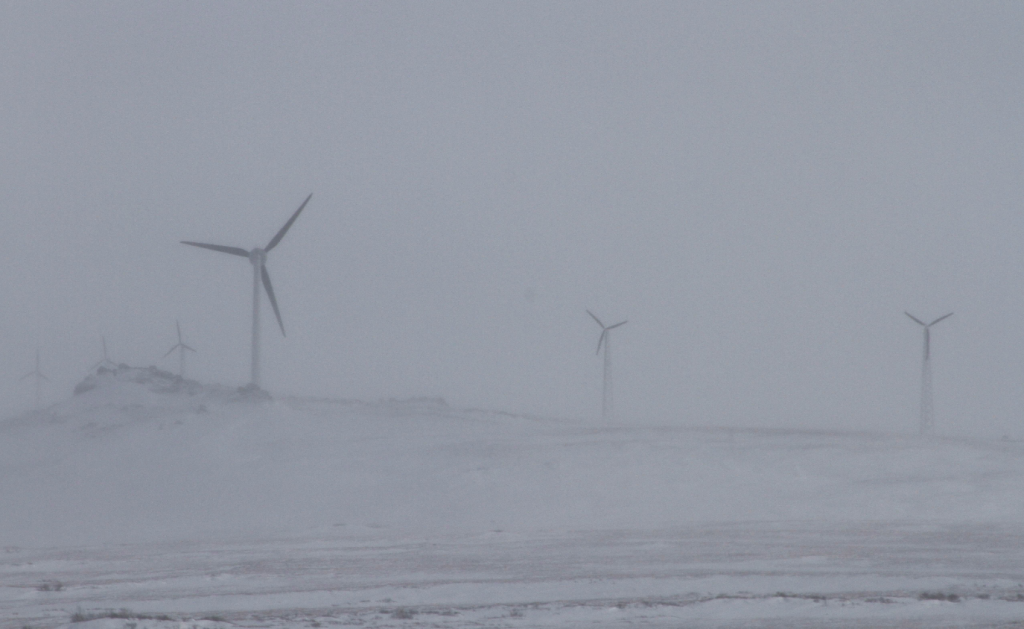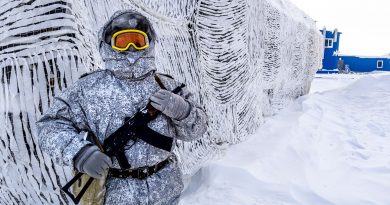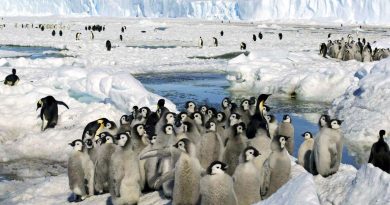Dunleavy: Alaska can boost fuels, renewables; clean energy advocates disagree

Standing in front of a crowd of energy experts and industry leaders in Anchorage last week, Gov. Mike Dunleavy outlined his vision for Alaska’s energy policy.
“When we talk about energy, for Alaska, it is going to be all-in,” Dunleavy told the audience at the Alaska Sustainable Energy Conference, which his administration helped organize.
Alaska is an oil and gas state, Dunleavy said, but it can no longer only be an oil and gas state. Going forward, he said, “it is going to be oil, it is going to be gas, it’s going to be wind, it’s going to be solar, it’s going to be geothermal, it’s going to be biomass, it’s going to be nukes.”
Alaska officials at the conference repeatedly made the case that the state should both increase fossil fuel production and boost renewables like wind and solar. But critics argue this vision ignores the devastating impacts of climate change.
Alaska has long faced an energy paradox. The state is a major oil producer, and oil taxes and royalties have for decades been a major revenue source, supporting state spending on everything from schools to roads. But most of that oil is shipped out of state. Meanwhile, rural communities in Alaska face some of the highest energy costs in the nation, often relying on expensive imported diesel and heating oil.
Build more renewable energy in-state to lower bills at home: Dunleavy
In an interview with Alaska Public Media, Dunleavy laid out his vision for how to address this dilemma. He argued that Alaska should double down on the production of fossil fuels as a revenue source, while building more renewable energy in-state to lower bills at home.
As part of that vision, Dunleavy and other Alaska officials used the conference to reiterate support for the Alaska LNG project: a proposed 800-mile natural gas pipeline from the North Slope to the Kenai Peninsula, which would potentially allow Alaska to export liquified natural gas to buyers in Asia.
“We want to be a player on the world stage in oil and gas, as well as coal, as well as biomass,” Dunleavy said in the interview. But, he added, “internally, we have to lower the cost of energy and make it stable. And that’s where you see a lot of the renewable concepts come into play.”
Dunleavy said for him, investing in renewables is not about lowering carbon emissions or combatting climate change, it’s about securing cheap energy for Alaskans that’s not tied to the volatile price of oil. The cost to operate renewable energy projects has dropped dramatically in recent years.
“From my perspective, if a diesel generator could be producing electricity at a very low cost consistently, we would consider that as well,” Dunleavy said.
But critics say this vision is short-sighted and fails to take climate change into account.
Climate change concerns
Phillip Wight, an energy historian at the University of Alaska, Fairbanks, said Alaska has pursued a similar approach for decades.
“Historically, Alaskans have not pursued renewable energy because of climate benefits. We have pursued renewable energy because it has reduced our reliance on diesel and other higher cost fossil fuels,” Wight said. “We’ve done it for economic reasons, not climate reasons.”
But Wight said today, as climate change accelerates, Alaska needs to consider more than just economic benefit.
Alaska faces growing impacts from climate change, from sea ice loss and thawing permafrost to species die-offs. Scientists say the world must slash carbon emissions, including from burning fossil fuels, nearly in half by the end of this decade to avoid the worst impacts of climate change. The state’s total contribution to the global oil and gas market is relatively small, but Wight argued that as long as Alaska continues to drill, it’s contributing to its own environmental problems.
“We’re still exacerbating a global problem, and a global problem where Alaska is warming four times faster than the rest of the planet,” Wight said. “We’re not escaping that problem. We’re on the front lines of the climate crisis.”
Proponents of fossil fuel production point out that there’s no clear alternative state revenue source that could replace oil production. But experts like Wight predict that as the world transitions away from fossil fuels, eventually Alaska will have to stop drilling. The International Energy Agency warned in 2021 that any new fossil fuel infrastructure would make it harder to meet global climate targets.
More investment needed?
Meanwhile, some clean energy advocates say the state still isn’t doing enough to invest in renewables at home. Rachel Christensen with The Alaska Center, an Anchorage-based nonprofit, said she’d like to see the governor make renewable policy a bigger priority.
“What we’re seeing is just talk about the potential of solutions,” Christiansen said. “We need to see him actually taking action on putting those into place.”
Christiansen pointed to two proposals that were before the legislature this year: one would have required utilities to source a certain amount of their energy from renewable projects. The other would have created a “green bank” to help finance renewable projects in small communities.
Dunleavy supported both, but neither passed. In response to Christiansen’s criticisms, a Dunleavy spokesperson reiterated the governor’s goal to provide Alaskans with low-cost, reliable sources of energy.
Christen said would also like to see the administration take climate change more seriously in its energy policy.
“It should be more than just an economic move,” Christiansen said. “Our people and industries are already feeling the effects of the climate crisis. And we can’t keep pushing these large scale extraction projects for export, just because it’s what we’ve always done.”
Related stories from around the North:
Canada: Nuclear power no solution for the N.W.T., some experts suggest, CBC News
Finland: Lapland among regions not in favour of wind power compensation for eastern Finland, Yle News
Norway: Will the green transition be the new economic motor in the Arctic?, Eye on the Arctic
Sweden: Wind farm delays in northern Sweden could hinder green revolution, Radio Sweden
United States: Alaska’s Northwest Arctic Borough gets $2 million tribal energy grant, Alaska Public Media



